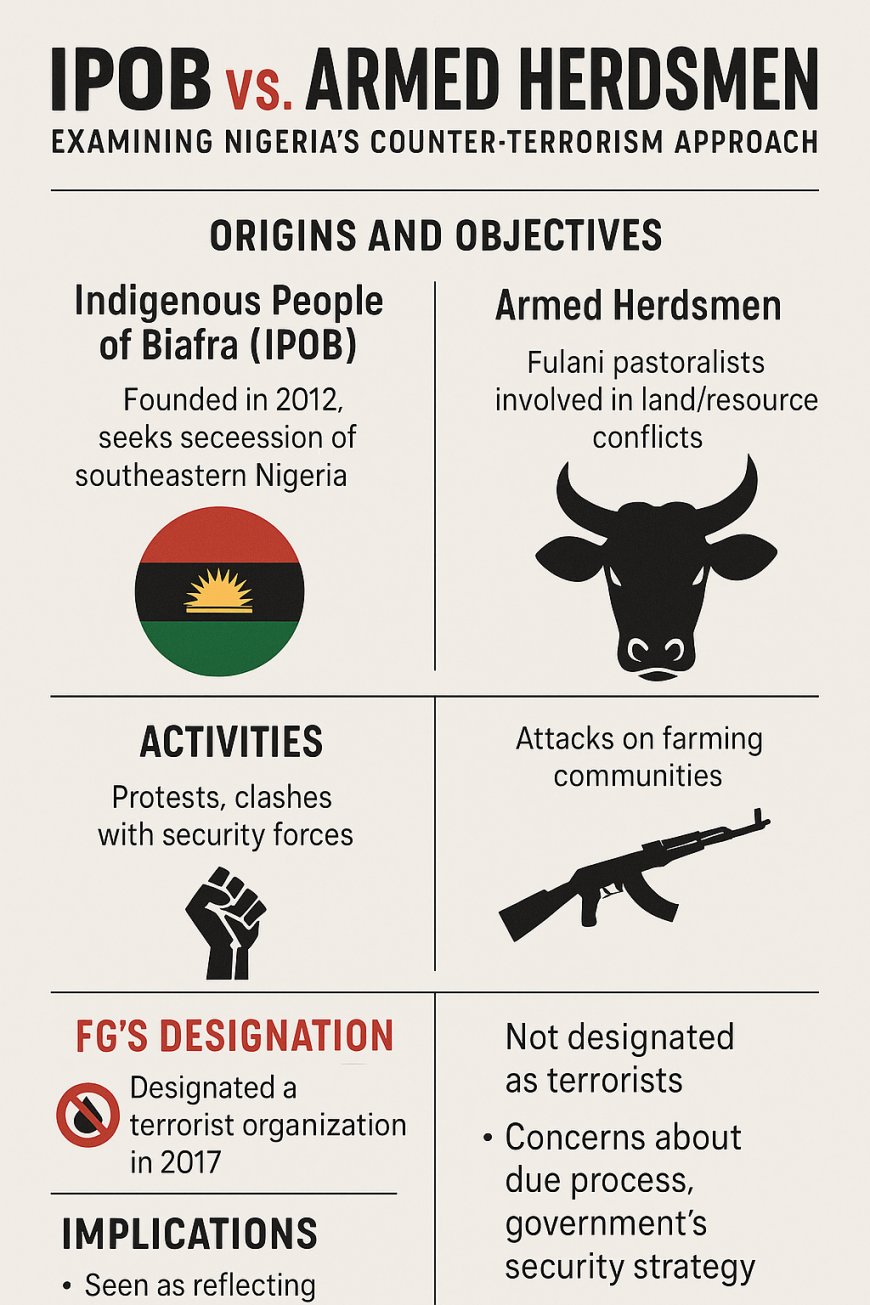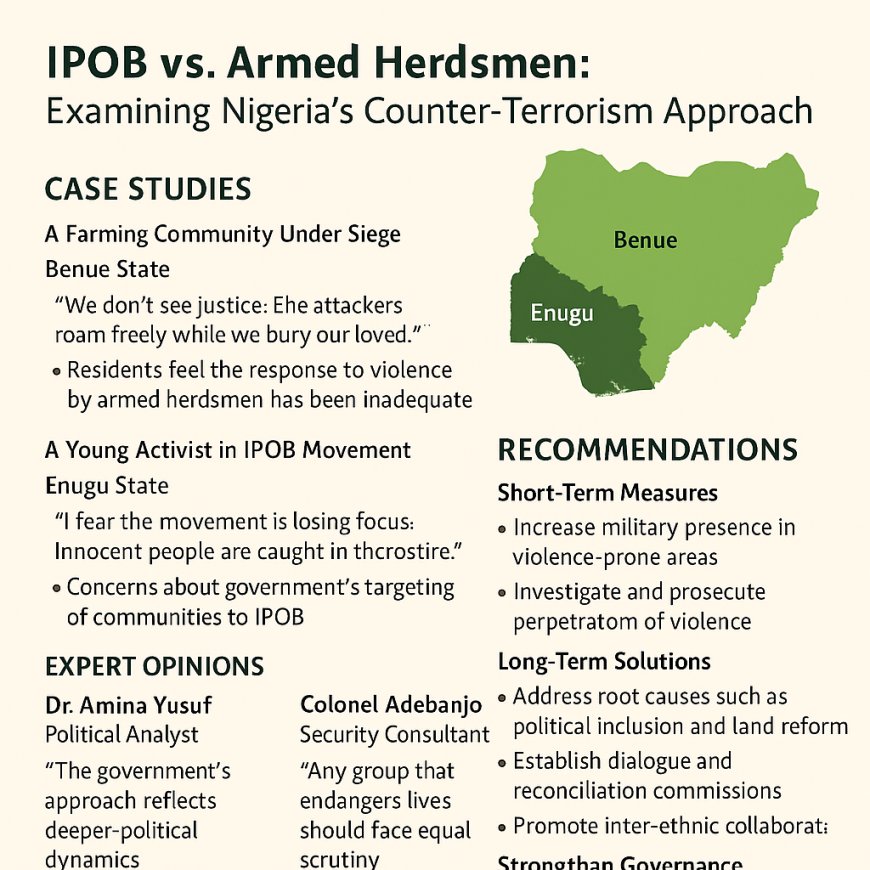IPOB vs. Armed Herdsmen: Examining Nigeria’s Counter-Terrorism Approach
Explore the complex dynamics of Nigeria's security landscape by comparing IPOB and armed herdsmen. This insightful analysis delves into ethnic tensions, governance challenges, and the Federal Government's response, offering solutions for sustainable peace and justice.

Introduction
Nigeria’s ongoing struggle with insecurity is a complex web of socio-political, economic, and historical factors. Among the most discussed challenges are the activities of the Indigenous People of Biafra (IPOB) and armed herdsmen. These groups represent different security concerns with unique origins, motivations, and implications. However, the Federal Government's (FG) differing responses—designating IPOB as a terrorist organization while refraining from doing the same for armed herdsmen—has sparked significant public discourse. This article explores the root causes, human impacts, and policy implications of these security challenges and offers insights into creating a more balanced and effective strategy.
Understanding IPOB and Armed Herdsmen
The Indigenous People of Biafra (IPOB)
IPOB is a secessionist movement founded by Nnamdi Kanu in 2012 to advocate for the revival of the defunct Republic of Biafra, which declared independence in 1967, sparking a civil war that lasted until 1970. [1] The group has mobilized large-scale protests and established the Eastern Security Network (ESN), a paramilitary wing, ostensibly to protect Igbo communities from external threats, particularly armed herdsmen. [2]
In 2017, the FG designated IPOB as a terrorist organization under the Terrorism (Prevention) Act, citing violent clashes and threats to Nigeria's territorial integrity. [3] However, this move has been controversial, with international observers, including the United States and the United Kingdom, declining to recognize IPOB as a terrorist entity. [4] Critics argue that the government’s approach undermines legitimate political dissent and exacerbates feelings of marginalization among the Igbo people.
Armed Herdsmen
Armed herdsmen, often associated with Fulani pastoralists, are linked to long-standing conflicts with farming communities over grazing routes and water resources. These disputes, exacerbated by desertification, population growth, and weak governance, have escalated into violent attacks, particularly in Nigeria’s Middle Belt region. [5] Villages have been razed, and thousands have been displaced, creating a humanitarian crisis. [6]

Despite the severity of their actions, the FG has refrained from labeling armed herdsmen as terrorists. Instead, their activities are categorized as criminal or banditry. This approach has drawn criticism, with many perceiving it as a double standard in the government’s counter-terrorism strategy. [7]
Human Stories: Case Studies from the Frontlines
A Farming Community Under Siege
In Benue State, a farming community was attacked by armed herdsmen at dawn, leaving dozens dead and many displaced. Mary, a survivor, recounts her experience:
“We heard gunshots, and people began screaming. My children and I ran into the forest. When we returned, our home was burned, and the crops we depended on were gone.”
Mary's story is a testament to the profound human cost of the herdsmen-farmer conflict. Entire communities have been uprooted, and livelihoods destroyed, with limited state intervention to provide security or justice. [8]
A Young Activist in the IPOB Movement
Chukwuemeka, a 28-year-old graduate from Enugu State, joined IPOB in 2019, driven by frustration over unemployment and perceived marginalization of the southeast:
“I believed IPOB could bring change. But now, I fear the movement is losing focus. Many are being arrested, and innocent people are caught in the crossfire.”
Chukwuemeka’s story highlights the complexities within IPOB. While many join out of genuine frustration with systemic inequities, others grow disillusioned as violence escalates and government crackdowns intensify. [9]
Expert Opinions: Policy and Strategy
Political Analysis
Dr. Amina Yusuf, a political analyst, emphasizes that the FG’s divergent approaches reflect deeper political dynamics:
“The government views IPOB’s secessionist rhetoric as a direct threat to Nigeria’s territorial integrity, prompting a hardline response. Armed herdsmen are framed as engaging in economic disputes rather than ideological conflicts, which explains the softer stance.” [10]
Security Insights
Colonel Adebanjo (Ret.), a security consultant, advocates for a consistent counter-terrorism strategy:
“Any group that endangers lives or undermines peace should face equal scrutiny. The FG must prioritize intelligence-driven operations to distinguish between criminals and innocent civilians.” [11]
Recommendations for a Balanced Approach
-
Consistent Legal Framework: All groups engaging in violence must face the same legal consequences, irrespective of their ethnicity or region. This includes transparent trials and equitable application of the law. [12]
-
Root Cause Mitigation:
-
Dialogue and Reconciliation:
-
Strengthen Local Governance:
-
Accountability and Transparency:
Finally
The divergent treatment of IPOB and armed herdsmen reflects broader challenges in Nigeria’s approach to national security. A fair, transparent, and inclusive strategy is essential to rebuild public trust, address underlying grievances, and ensure sustainable peace. By adopting policies rooted in justice and equity, the FG can strengthen Nigeria’s unity and pave the way for a more secure future.







